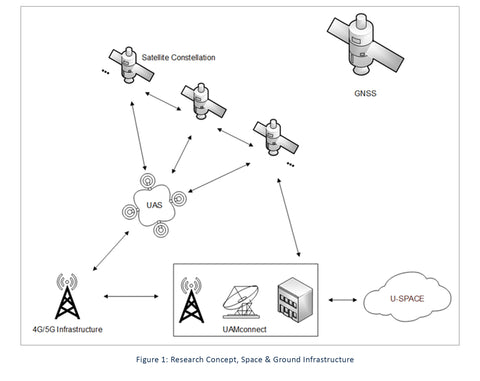The European Space Agency (ESA) Space Solutions has selected a consortium comprising Droniq, CGI Deutschland and E.SAT, and the Oberpfaffenhofen Application Centre (AZO) to carry out the Space for Urban Air Mobility (UAM) study, according to a Droniq press release.
The aim of the study is to evaluate a satellite-based communication solution for urban air mobility under BVLOS conditions where no mobile network coverage is available. In this way, secure and reliable communication between the drone and the ground station is to be ensured for regular operation and for emergency situations in the future. A corresponding communication link should also enable the drone about The communication link should also inform the drone about current flight data and enable it to be controlled remotely in an emergency.
Coordinating a large number of unmanned aerial vehicles in the airspace requires stable communication at all times, even when a cellular connection is not available, especially at higher altitudes. Increasing flight density also requires a digital, automated air traffic management system with the ability to establish no-fly zones, reschedule flights and control drones in emergency situations. The study aims to generate a new, extended solution approach for these requirements.
The consortium will test the potential of various space-based services and systems for this purpose. Data transmission via satellite is just as suitable as mobile radio for the transfer of position data, information on the activation of no-fly zones, command and control information, data on the payload and operating data of the drone as well as traffic or weather information.
The results of the study could also be used to create a new, satellite-based interface to traffic management systems for drones (UTM) for the first time.
“Especially in areas where mobile phone coverage is not provided, such as over the sea, alternatives are needed to enable safe drone use,” says Droniq COO Ralph Schepp. “With the feasibility study, we, as part of the consortium, want to create the conditions for further expanding drone use in Germany and making it even safer in the future. As Droniq, we are pleased to contribute our expertise in the interplay between unmanned aviation, manned aviation and telecommunications.”
“The integration of drones into the airspace is one of the most demanding challenges of aviation in the coming years and will change it in a revolutionary way,” comments Thorsten Rudolph, Managing Director of AZO and project leader. “Research and development in the space and Earth observation sectors will play an essential role in this. We are proud to pave the way for the introduction of new key technologies with our many years of experience in the commercialisation of space applications as well as our Europe-wide network in this field.”
For more information visit:
www.droniq.de




